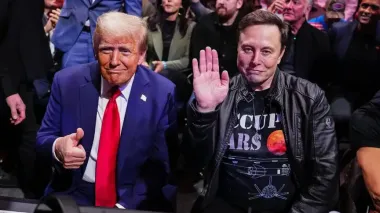Musk confirms his resignation from government service

Musk quits civil service: what are the achievements?
A White House representative confirmed Musk's dismissal from the government on May 28.
Musk took to his social media platform X to thank President Donald Trump, saying his time as a special civil servant at the Department of Government Efficiency (DOGE) was coming to an end.
His departure was swift and unceremonious. He had no formal conversation with Trump about it, according to a source familiar with the situation. The source added that the resignation was decided “at the senior staff level.”
While the exact circumstances of his resignation are still unclear, Musk is leaving his position a day after criticizing Trump's tax bill, calling it too costly and a measure that would undermine his work at DOGE.
According to a source familiar with the situation, some senior White House officials, including Deputy Chief of Staff Stephen Miller, were particularly irked by the comments, and the White House was forced to convene Republican senators to reaffirm Trump's support for the package.
Although Musk remains close to the president, his departure came after a gradual but steady decline in his approval ratings.
Since Trump’s inauguration, the billionaire has quickly become a powerful force in his orbit: high-profile, unabashedly brash, and unfettered by traditional norms. At the Conservative Political Action Conference in February, he brandished a red metal chainsaw to thunderous applause. “It’s a chainsaw for bureaucracy,” he declared.
During the election campaign, Musk claimed that DOGE could save federal spending by at least $2 trillion. DOGE currently estimates that its efforts have saved $175 billion, a figure that cannot be verified.
Musk has made no secret of his hostility toward federal employees and has said that eliminating the "COVID-era privilege" of remote work will trigger a "wave of voluntary layoffs."
But some members of the administration grew wary of his tactics, the sources said. They eventually became more assertive in opposing his cuts, emboldened by Trump’s reminder in early March that personnel decisions rest with department secretaries, not Musk.
Musk clashed with three of Trump's most senior cabinet members — Secretary of State Marco Rubio, Transportation Secretary Sean Duffy, and Treasury Secretary Scott Bessant — and called Trump's trade adviser Peter Navarro an "idiot" and "dumber than a sack of bricks."
Musk has recently begun to hint that his tenure in government is coming to an end, while occasionally expressing frustration that he cannot cut spending more decisively.
During a Tesla conference call on April 22, he made it clear that he would significantly reduce his government work to focus on his business.
According to a Reuters review of agency layoffs, Trump and DOGE have managed to cut nearly 12%, or 260,000, of the 2.3 million federal civil servants, largely through threats of layoffs and offers of early retirement.










